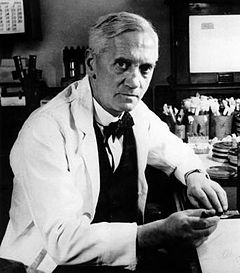Accident is the name of the greatest of all Inventors
 Sir Alexander Fleming FRSE, FRS, FRCS(Eng).
Sir Alexander Fleming FRSE, FRS, FRCS(Eng).
"When I woke up just after dawn on September 28, 1928, I certainly didn't plan to revolutionize all medicine by discovering the world's first antibiotic, or bacteria killer," Alexander Fleming would later say, "But I guess that was exactly what I did." .
By 1928, Alexander Fleming was already well-known from his earlier work, and had developed a reputation as a brilliant researcher, but quite a careless lab technician; he often forgot cultures that he worked on, and his lab in general was usually in chaos. After returning from a long holiday, Fleming noticed that many of his culture dishes were contaminated with a fungus, and he threw the dishes in disinfectant. But subsequently, he had to show a visitor what he had been researching, and so he retrieved some of the unsubmerged dishes that he would have otherwise discarded. He then noticed a zone around an invading fungus where the bacteria could not seem to grow. Fleming proceeded to isolate an extract from the mould, correctly identified it as being from the Penicillium genus, and therefore named the agent penicillin.
 Prevent Antibiotic Resistance.This poster intended for use in doctors' offices and other healthcare facilities, warns that antibiotics do not work for viral illnesses such as the common cold.
Prevent Antibiotic Resistance.This poster intended for use in doctors' offices and other healthcare facilities, warns that antibiotics do not work for viral illnesses such as the common cold.
Fleming published his discovery in 1929 in the British Journal of Experimental Pathology, but little attention was paid to his article. Fleming continued his investigations, but found that cultivating penicillium was quite difficult, and that after having grown the mould, it was even more difficult to isolate the antibiotic agent. Fleming's impression was that because of the problem of producing it in quantity, and because its action appeared to be rather slow, penicillin would not be important in treating infection. Fleming also became convinced that penicillin would not last long enough in the human body to kill bacteria effectively.
Fleming soon abandoned penicillin, and not long after Ernst Chain and Howard Florey took up researching and mass producing it with funds from the U.S and British governments. They started mass production after the bombing of Pearl Harbor. When D-day arrived they had made enough penicillin to treat all the wounded allied forces.
After the team Ernst Chain and Howard Florey had developed a method of purifying penicillin to an effective first stable form in 1940, several clinical trials ensued, and their amazing success inspired the team to develop methods for mass production and mass distribution in 1945.
Fleming's accidental discovery and isolation of penicillin in September 1928 marks the start of modern antibiotics.